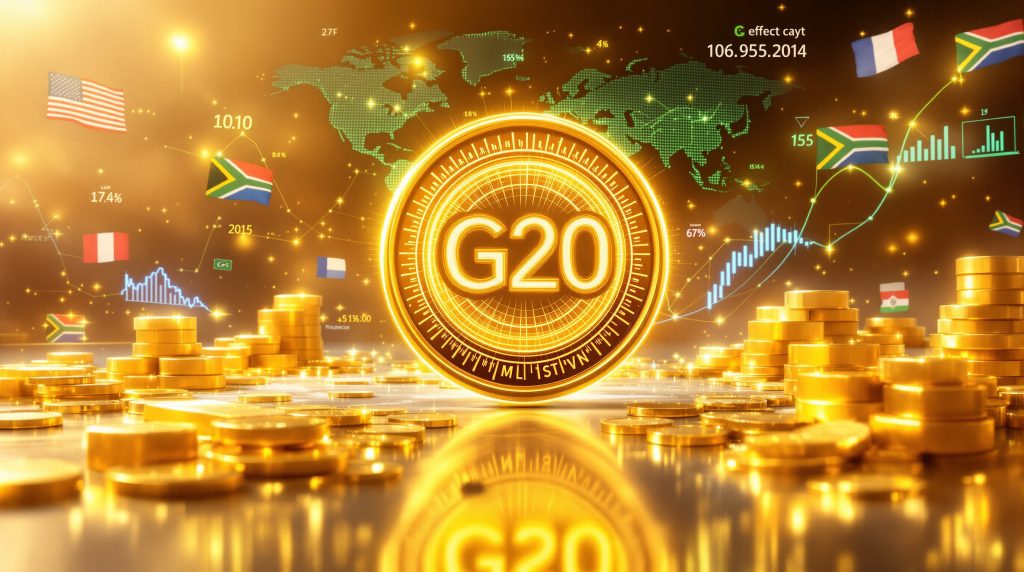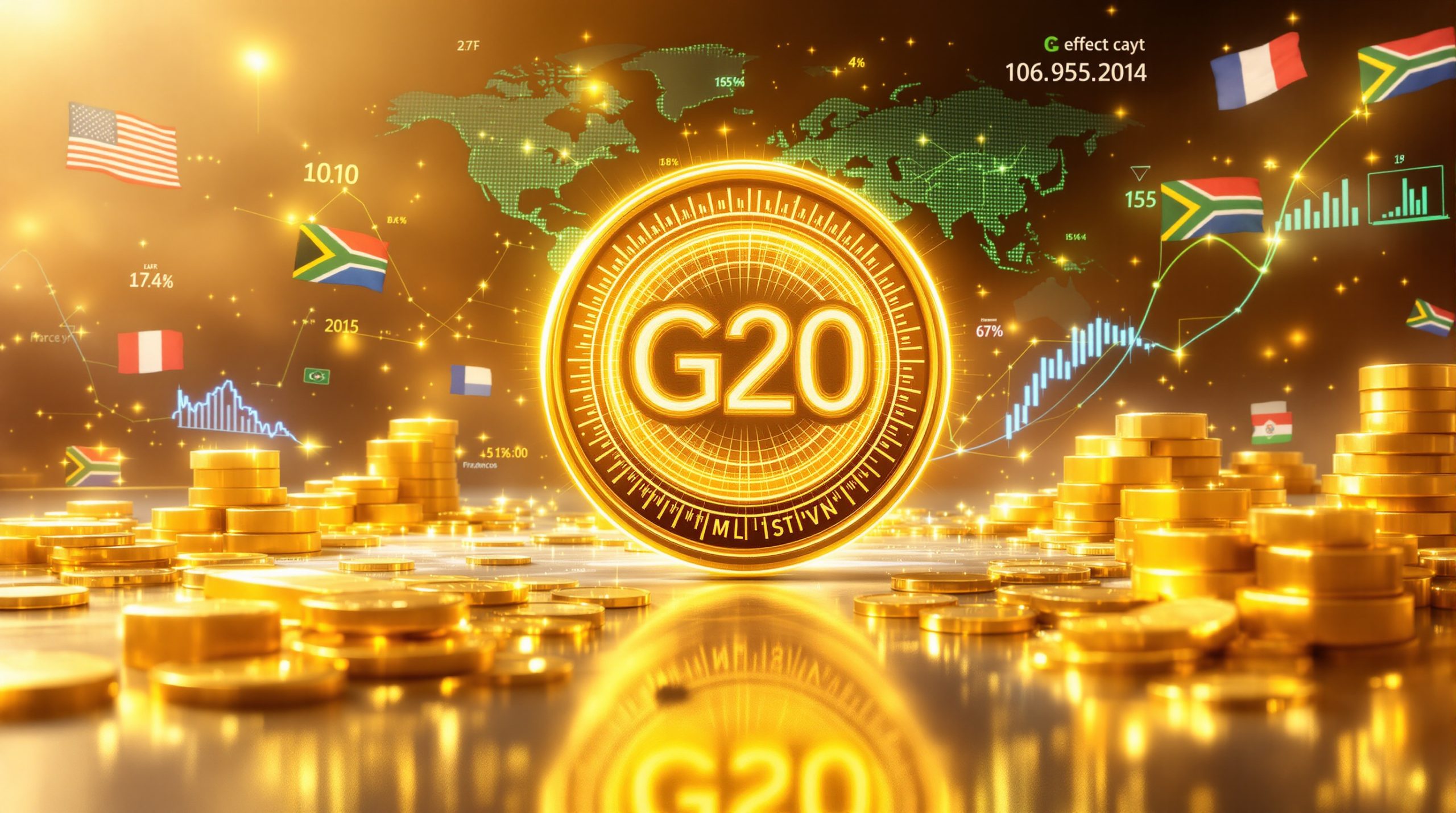The Global Gold Rush: How Record Prices Are Driving International Action
Getting gold on G20 agenda has become increasingly crucial as record gold prices have captured worldwide attention, with the precious metal soaring 66% in value during recent months. This meteoric rise reflects more than simple investment gains – it signals profound concerns about global financial stability and debt sustainability. The International Monetary Fund projects that worldwide debt will exceed 100% of GDP by 2029, with the United States potentially facing trade deficits reaching 8% annually.
These economic pressures have transformed gold from a traditional store of value into a mainstream portfolio essential. Third-quarter purchases of gold-backed exchange-traded funds reached a record-breaking $26 billion globally, with American markets accounting for $16 billion of this investment surge. Central banks have emerged as consistent net purchasers since the pandemic began, accumulating reserves as confidence in traditional currencies wavers.
The Shadow Economy: Understanding Illegal Gold Trade Networks
Behind gold's legitimate market success lurks a darker reality. Industry estimates suggest that approximately 20% of global gold production flows through illegal channels, representing an underground economy worth $95 billion annually. This illicit trade network has grown increasingly sophisticated, exploiting the metal's rising value to finance criminal enterprises and terrorist organizations worldwide.
The scale of illegal gold operations has expanded dramatically as the gold market surge continues. Current gold values of approximately R2.3 million per kilogram represent an R800,000 increase from late 2024 levels, creating unprecedented incentives for unlawful extraction and smuggling activities. Criminal organizations have recognised gold's advantages over traditional contraband – it maintains value, faces fewer detection risks, and provides easier transport logistics than bulk commodities.
Criminal Networks Exploiting Gold Markets
Several major criminal and terrorist organisations have integrated gold trafficking into their operational frameworks:
- Colombian FARC: Revolutionary groups find gold smuggling operations less risky than cocaine trafficking
- Islamic State: Utilises gold mining revenues to finance territorial expansion and military activities
- Russia's Africa Corps: Leverages gold extraction to fund geopolitical interventions across the continent
- Local criminal syndicates: Force mining communities into exploitative supply arrangements
These organisations exploit vulnerable artisanal mining communities, creating cycles of violence, child labour exploitation, human trafficking, and environmental destruction. The higher gold prices climb, the more attractive these illegal operations become for criminal enterprises seeking alternative revenue streams.
Environmental and Social Devastation from Illegal Mining
The environmental consequences of illegal gold extraction extend far beyond immediate mining sites. Ghana's illegal mining operations, locally known as "galamsey" (meaning "gather them and sell"), exemplify the devastating ecological impact of unregulated gold extraction. Industry experts warn that continued mercury contamination from illegal mining could render 80% of Ghana's water supply undrinkable within the next decade.
Mercury usage in artisanal gold extraction creates long-term environmental hazards affecting entire watersheds. The toxic metal accumulates in water systems, contaminating agricultural lands and threatening food security for millions. Beyond water pollution, illegal mining operations destroy forest ecosystems, eliminate agricultural productivity, and create uninhabitable landscapes that force population displacement.
The Human Cost of Gold's Success
Rising gold prices have triggered massive social disruption in mining regions. Traditional agricultural communities abandon subsistence farming to pursue gold extraction, creating skills shortages in essential sectors. Furthermore, even civil service personnel responsible for law enforcement and governance have joined the mining exodus, leaving communities without adequate administrative capacity.
In the Central African Republic, police services face critical staffing shortages as officers abandon their posts for mining opportunities. This governance vacuum creates conditions where illegal operations flourish without meaningful oversight or intervention. Consequently, the resulting social breakdown enables criminal organisations to establish territorial control and exploit local populations.
International Organisations Leading Reform Efforts
World Gold Council's Comprehensive Approach
The World Gold Council has developed multi-layered strategies to combat illegal gold trade through legitimate market alternatives. Their London Principles Framework focuses on central bank cooperation to create domestic purchasing programmes that provide artisanal miners with legal market access. Initial signatories include Mongolia, the Philippines, Colombia, and Ecuador, with additional countries expressing interest in participation.
However, the council's infrastructure development strategy emphasises establishing regional processing facilities funded by foreign capital investment. These facilities would offer better pricing structures than illegal buyers while implementing environmentally responsible extraction methods. The transition from mercury-based to cyanide-based extraction processes represents a significant environmental improvement, though both methods require careful handling and disposal protocols.
London Bullion Market Association Standards Evolution
The London Bullion Market Association has committed to comprehensive supply chain transparency by 2027. This ambitious timeline requires documenting complete gold flow pathways from extraction through final sale. Currently, only 1-2% of global gold production meets artisanal mining standards accepted by accredited refiners, highlighting the massive infrastructure challenge ahead.
Digital validation systems represent a key component of future traceability efforts. These technologies could provide real-time supply chain documentation, automated compliance verification, and cross-border information sharing capabilities. Nevertheless, implementation requires coordination among multiple stakeholders, including governments, mining communities, refiners, and international organisations.
South Africa's Unique Position in G20 Leadership
South Africa's G20 presidency provides unprecedented opportunities to address illegal gold mining through international cooperation. The country's direct experience with mining challenges offers credible leadership on this issue. Recent incidents underscore the problem's severity – 78 deaths were recorded at the defunct Stilfontein mine, while 4,000 arrests occurred at Barberton gold mines during enforcement operations.
Illegal miners in South Africa have begun extracting gold from infrastructure built decades ago. Roads constructed in the 1970s using waste ore from the former Durban Roodepoort Deep mine contain approximately one gram of gold per ton of rock – significantly higher than the 0.189 grams per ton that legitimate operators typically process from tailings operations.
G20 Policy Framework Opportunities
South Africa's leadership position enables advocacy for comprehensive international action across three critical areas:
Traceability Enhancement
- Implementation of digital documentation systems
- Development of supply chain verification protocols
- Creation of real-time monitoring capabilities
- Establishment of cross-border information sharing mechanisms
Processing Infrastructure Development
- Construction of regional processing facilities
- Technology transfer programmes for developing nations
- Capacity building initiatives for local communities
- Environmental standards implementation and enforcement
Centralised Purchasing Systems
- Central bank coordination for domestic programmes
- Legitimate market access for artisanal miners
- Price stability mechanisms to compete with illegal buyers
- Community development programmes funded through legitimate sales
Technological Solutions for Supply Chain Transparency
Digital Trading Innovation
Major financial institutions are developing revolutionary approaches to gold trading that could enhance transparency whilst reducing costs. HSBC and JPMorgan support programmes developed in collaboration with the Bank of England to create fractional trading systems that eliminate physical transport requirements whilst maintaining asset security.
These digital pooling systems allow trading of gold interests without moving physical bars between locations. The technology reduces capital requirements for banks whilst creating opportunities for comprehensive digital documentation of ownership chains. Each transaction could generate immutable records that trace gold from extraction through final sale.
Blockchain Integration Potential
Blockchain technology offers promising solutions for gold supply chain verification:
| Technology Feature | Application | Benefit |
|---|---|---|
| Immutable Records | Provenance Documentation | Permanent ownership history |
| Real-time Tracking | Transaction Monitoring | Immediate compliance verification |
| Automated Compliance | Smart Contracts | Reduced administrative burden |
| Cross-border Settlement | International Trade | Faster, cheaper transactions |
However, blockchain implementation faces significant challenges. The technology requires substantial infrastructure investment, widespread adoption among stakeholders, and regulatory frameworks that support digital documentation. Additionally, mining innovation trends indicate that artisanal mining communities often lack the technological infrastructure needed to participate in digital verification systems.
France's Strategic G7 Leadership Role
France's assumption of G7 leadership from Canada in 2025 creates strategic opportunities for advancing gold trade reform. Historical connections to West African gold-producing regions provide France with unique insights into the challenges facing artisanal mining communities. Burkina Faso, a former French colony, exemplifies the dual challenges of significant gold production alongside persistent terrorist threats.
Niger's strategic importance as a uranium producer adds complexity to regional dynamics. Both countries face governance challenges exacerbated by illegal mining operations that fund terrorist activities whilst undermining state capacity. For instance, France's leadership position enables advocacy for coordinated international responses that address both security and economic development concerns.
Political Momentum for Change
Current geopolitical conditions create unprecedented opportunities for meaningful reform:
- Security concerns: Terrorist financing through illegal gold trade threatens regional stability
- Environmental urgency: Mercury contamination creates irreversible ecological damage
- Economic incentives: Record gold prices make legitimate operations financially viable
- Technological readiness: Digital solutions provide scalable implementation pathways
The convergence of these factors suggests that international action on gold trade reform may achieve broader support than previous attempts at regulatory coordination.
Market Psychology and Investment Implications
Safe-Haven Demand Drivers
Gold's remarkable price performance reflects deep-seated concerns about global financial stability. The metal's transformation into a mainstream portfolio component represents a fundamental shift in investor psychology. Traditional assumptions about diversification have evolved as concerns about currency devaluation and sovereign debt sustainability intensify.
Central bank purchasing patterns provide important insights into institutional thinking about global economic risks. Net gold accumulation since the pandemic suggests that even monetary authorities question the long-term stability of existing financial systems. This institutional validation reinforces gold's appeal among private investors seeking portfolio protection.
Investment Strategy Considerations
The illegal gold trade crisis creates both risks and opportunities for investors:
Risk Factors
- Reputational damage for companies with compromised supply chains
- Regulatory scrutiny of gold-related investments
- Price volatility from enforcement actions against illegal operations
- Environmental liability concerns for mining-related investments
Opportunity Areas
- Premium valuations for certified ethical gold producers
- Technology companies providing supply chain solutions
- Financial services firms developing digital trading platforms
- Companies supporting artisanal mining community development
Implementation Challenges and Realistic Timelines
Scale Requirements and Resource Allocation
Successfully combating illegal gold trade requires massive infrastructure development. Industry estimates suggest that thousands of processing units would be needed globally to provide legitimate alternatives for artisanal miners. This scale requirement presents significant challenges for funding, staffing, and technical support.
Regional processing facilities must offer competitive pricing to displace illegal buyers whilst maintaining profitability. The economics become complex when considering transportation costs, security requirements, and environmental compliance expenses. Foreign capital investment can provide initial funding, but long-term sustainability requires profitable operations that benefit local communities.
Political Coordination Complexities
International cooperation on gold trade reform faces numerous political obstacles. National sovereignty concerns limit the scope of external intervention in domestic mining policies. Corruption within local governments can undermine well-intentioned programmes if implementation lacks adequate oversight mechanisms.
Different countries face varying combinations of challenges – some struggle with criminal organisation control, others with environmental degradation, and many with inadequate governance capacity. Successful reform requires flexible approaches that address specific regional circumstances whilst maintaining coherent international standards.
Measuring Success: Defining Realistic Outcomes
Economic Performance Indicators
Effective international gold trade reform should achieve measurable improvements across several dimensions:
Market Transparency Metrics
- Reduction of illegal trade from 20% to single-digit percentages of global gold production
- Increased participation of artisanal miners in legitimate markets
- Enhanced price stability through transparent trading mechanisms
- Improved investor confidence in gold-backed financial instruments
Community Development Outcomes
- Legitimate employment opportunities replacing exploitative arrangements
- Reduced child labour and human trafficking in mining regions
- Improved health and safety standards in extraction operations
- Enhanced local governance capacity through legitimate revenue streams
Environmental Restoration Goals
Long-term success requires addressing the environmental devastation created by illegal mining operations through comprehensive environmental restoration in mining programmes:
- Mercury elimination from artisanal extraction processes
- Water resource protection and contamination remediation
- Sustainable mining practice adoption across the sector
- Ecosystem preservation in environmentally sensitive areas
The Path Forward: International Cooperation Requirements
Success in combating illegal gold trade requires sustained commitment from multiple stakeholders. Governments must provide political leadership whilst industry organisations develop technical solutions. Over 500 economists and top experts have highlighted the importance of coordinated international action on this issue.
Furthermore, international financial institutions can support infrastructure development whilst mining companies ensure responsible sourcing practices. Putting gold on G20 agenda represents a critical moment for international action, particularly as record gold prices create maximum incentives for both legal and illegal operations.
The G20's attention to gold trade reform makes this period decisive for establishing new frameworks. Countries that act decisively to implement transparent, community-beneficial mining systems will likely capture increasing market share as buyers demand verified provenance. In addition, this comprehensive approach requires addressing the interconnected challenges of governance, technology, and community development.
Disclaimer: This analysis includes forward-looking assessments about gold markets, international policy coordination, and technological implementation timelines. Actual outcomes may vary significantly based on political developments, market conditions, and implementation challenges. Investment decisions should consider multiple factors beyond the scope of this discussion.
The transformation of gold from a traditional store of value into a mainstream portfolio essential has created both opportunities and obligations for the global community. International organisations, governments, and industry stakeholders now have the resources and motivation to address long-standing challenges in the precious metals sector. The question remains whether political will can match the scale of action required to transform this critical global industry.
Ready to Capitalise on Gold Market Opportunities?
Discovery Alert's proprietary Discovery IQ model delivers real-time alerts on significant ASX mineral discoveries, instantly empowering subscribers to identify actionable opportunities ahead of the broader market as gold prices continue reaching record highs. Begin your 30-day free trial today and secure your market-leading advantage in one of the most dynamic precious metals markets in decades.




